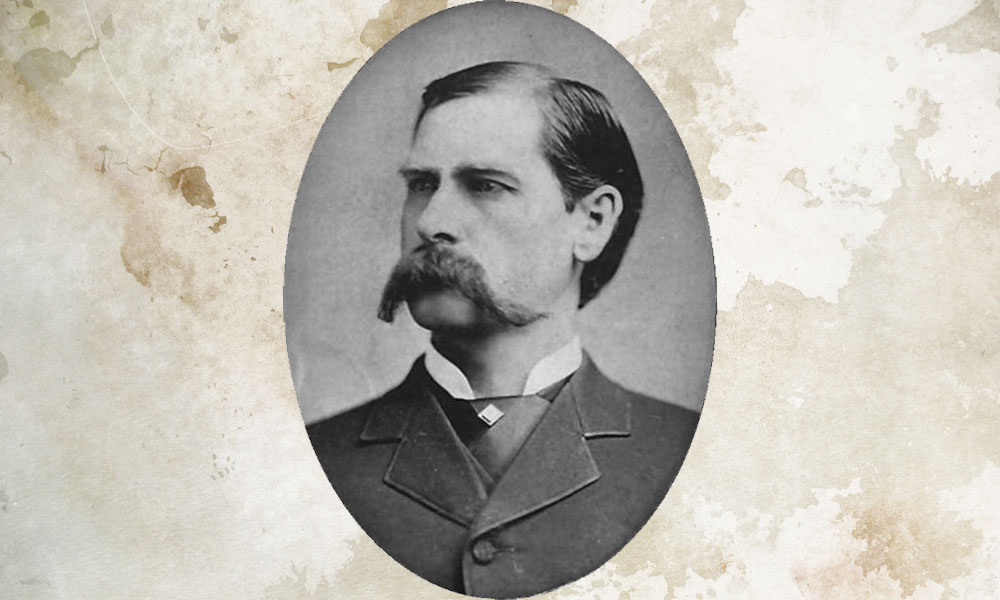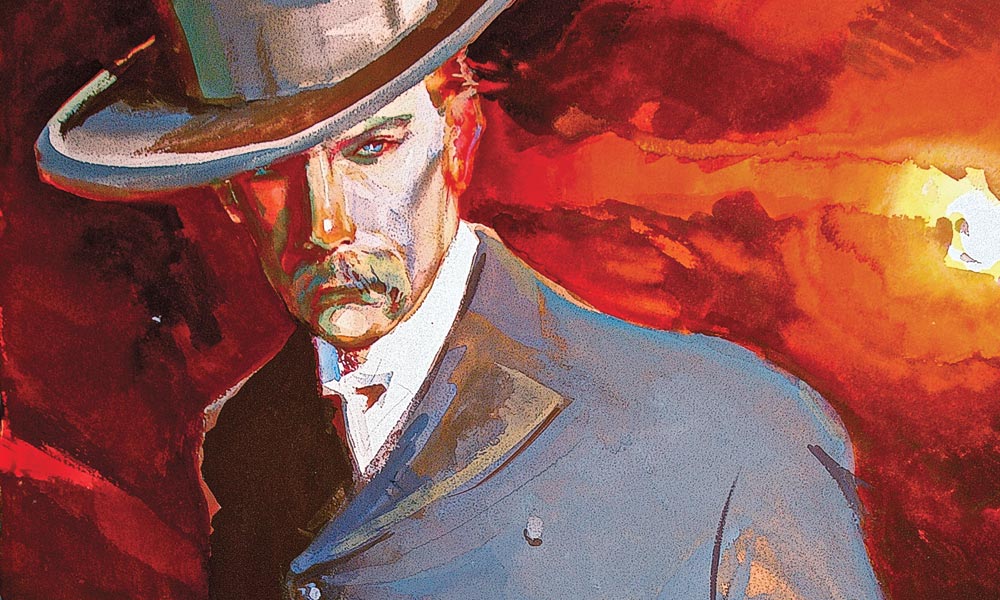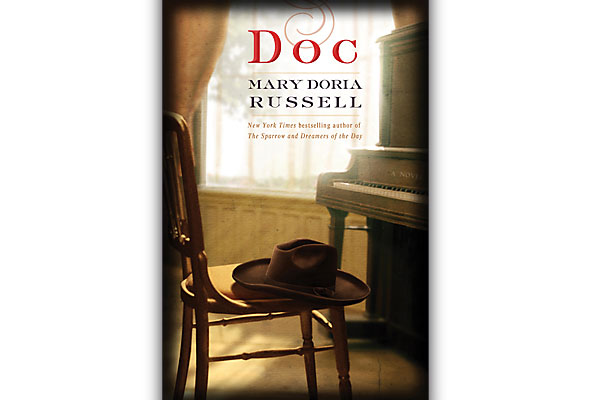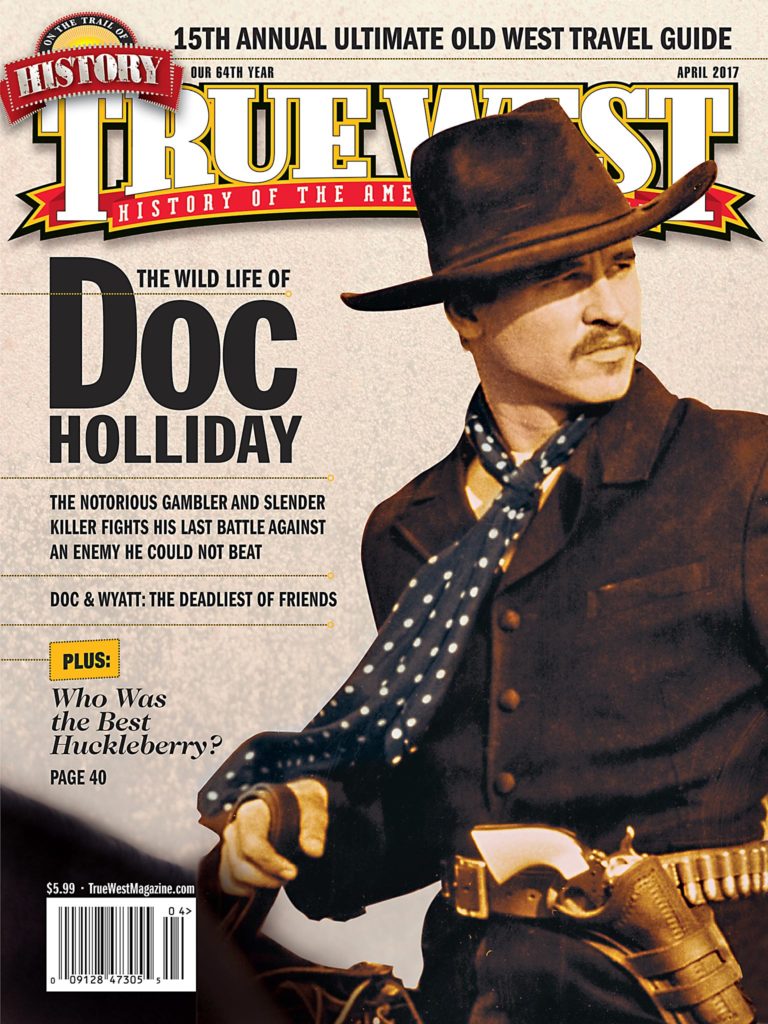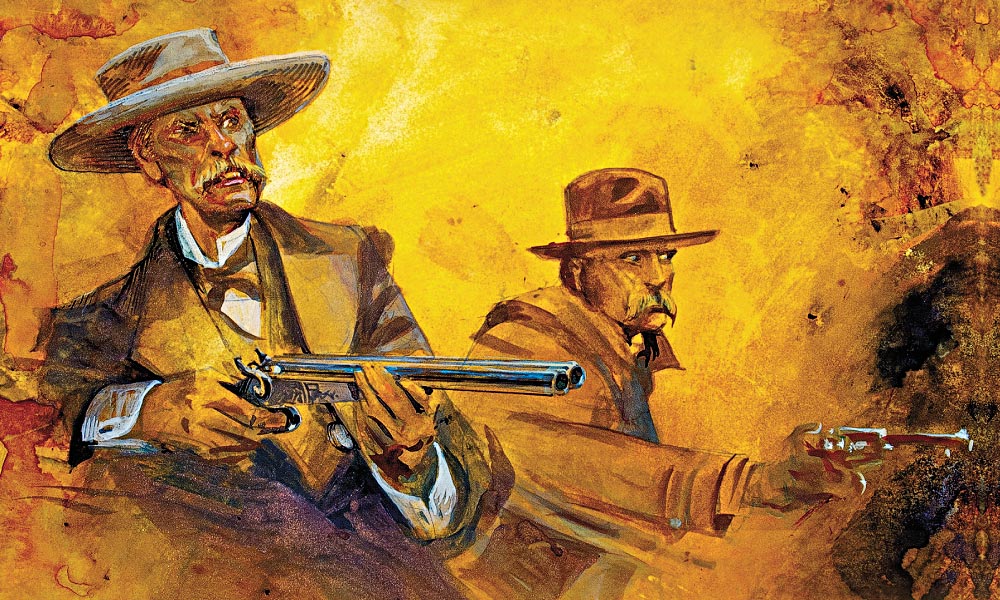
– All photos True West archives/Illustrations by Bob Boze Bell –
John Henry “Doc” Holliday had a restless year in 1877.
The dentist-turned-gambler had spent time in Cheyenne, Wyoming, and in Denver, Colorado. Then, though never to be mistaken for a family man, he had visited an aunt in Kansas. The next stop was Texas.
In Breckenridge, he resumed gambling. There were fireworks on July 4, but not to celebrate the country’s independence. Doc and another man, Henry Kahn, also a gambler and a member of a Dallas clothing family, got into an argument.
Instead of going for his gun, Doc, reverting to his Southern roots, used his walking stick on the other man. Local peace officers interrupted the fight and arrested both men, who were later fined and released.
Doc made a mistake—rather, two mistakes.
One was not fully appreciating Kahn’s continuing anger at being beaten. The second mistake was going out without his guns. When confronted, even though Doc was unarmed, Kahn shot him. Three days later, The Dallas Weekly Herald reported that Doc Holliday had died.
He hadn’t, but the serious wound combined with his worsening tuberculosis made it a close call. A change of scenery seemed like a good idea.
His next stop was in Fort Griffin, and it was there he met the two people who would be the closest to him for the rest of his life—Mary Katherine Haroney, known as Kate Elder, and Wyatt Earp.
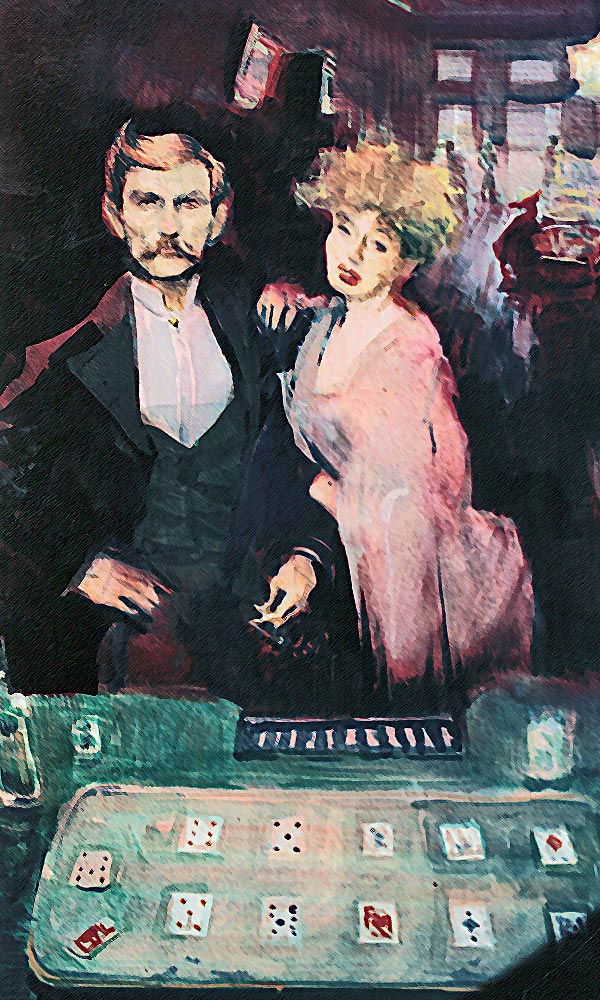
Trouble in Texas
In November 1877, Wyatt left Dodge City, Kansas. As usual, he wanted to make more money than off-season lawing offered, but instead of returning to Deadwood, Dakota Territory, to deal faro, Wyatt wound up in Texas. That is where the trail of a gang of train robbers took him, men he had been hired to find.
In October 1877, a gang of thieves had robbed a Santa Fe Railroad construction camp. The gang was led by “Dirty” Dave Rudabaugh, a 23-year-old Illinois native. He earned the nickname naturally, by bathing infrequently and wearing clothes that even by frontier standards were quite filthy.
The October robbery had taken place in Kansas, and it was believed the thieves had escaped into Texas, so a deputy U.S. marshal was required to do the chasing. That job was given to Wyatt.
This would be lonely, dangerous and exhausting work. Certainly, Wyatt could have made more money at the gaming tables. It can only be conjectured that the challenge appealed to him. If there wasn’t enough action in Dodge City to make lawing worthwhile there, Wyatt would bring it with him on the road.
Day after day, for 400 miles, he tracked Dirty Dave and his gang through Kansas and the Panhandle and deeper into Texas. Along the way he was buffeted by the late-autumn winds, his face swept by sand and grit, traveling from one watering hole to the next, being told tales of the gang having passed through, some of them true.
When Wyatt arrived in Fort Griffin, he came to a different sort of watering hole, the Bee Hive Saloon. A honeysuckle-bordered sign out front offered: “Within this hive we’re all alive, Good whiskey makes us funny, So if you’re dry come up and try, The flavor of our honey.”
Wyatt would have enjoyed the faro games inside more than the whiskey, but the reason he entered the saloon was that he knew it was owned by John Shanssey, whom he had met before during a detour to Wyoming.
Shanssey revealed that Rudabaugh had been in his establishment several days earlier but was gone, destination unknown. He suggested that Wyatt ask the man sitting by himself at the table in the back corner, because the man had somehow managed to hold his breath long enough to play a few hands of cards with Dirty Dave.
Doc Holliday invited Wyatt Earp to sit down. When Wyatt declined, Doc poured a shot of whiskey just for himself. Holliday, though only 26 years old, had a haggard face and a chronic cough. He dressed well, and his face showed some spark thanks to his deep-set blue eyes and neatly trimmed mustache.
Sitting at the table idly dealing cards, Doc couldn’t say for sure where Dirty Dave Rudabaugh and his fellow outlaws were, but he suspected from a few comments made that they had doubled back to Kansas. Word had traveled faster than Wyatt’s horse that the former Dodge City lawman was trailing the gang into Texas, and doing what was not expected might enhance their escape.
This made sense enough to Wyatt that he headed over to the telegraph office and sent a message to the sheriff of Ford County that the gang of thieves might be back in the area. Upon receiving the telegram, Bat Masterson, the top lawman in southeast Kansas, put together a posse.
An Uneasy Truce
If Bat Masterson had known that the deputy U.S. marshal’s hunch was helped along by Doc Holliday, he might have tossed it aside.
The two men quickly came to dislike each other and observed an uneasy truce only because they were Wyatt’s best friends. One indication of how generally unlikable Doc was could be summed up this way: if the gregarious and often cheerful Bat wanted to have as little to do with you as possible, you must be rather unappealing company.
Thirty years later, in a magazine essay about Doc Holliday, Bat began in an evenhanded way: “While he never did anything to entitle him to a Statue in the Hall of Fame, Doc Holliday was nevertheless a most picturesque character on the western border in those days when the pistol instead of law determined issues.”
He went on: “Holliday had a mean disposition and an ungovernable temper, and under the influence of liquor was a most dangerous man…. Physically, Doc Holliday was a weakling who could not have whipped a healthy fifteen-year-old boy in a go-as-you-please fist fight,” pointing out that this was why Doc was quick to go for his gun when threatened.
However, that January, such judgments were ahead of him, plus Bat doubted that Wyatt could be hoodwinked with false information. Thus, he acted on the belief that Dirty Dave and his gang were back in Kansas. Bat put together a posse that consisted of “Prairie Dog” Morrow, John Joshua Webb and his former boss, Charlie Bassett.
The third week in January, having by then been duly sworn in, and braving the risk of blizzards, Sheriff Masterson set off with his posse for the territory between Dodge City and for the Texas Panhandle, which included the Cherokee Strip. They picked up signs on the trail that made them think the Rudabaugh group was in the area. Nasty winter weather caused Bat and his deputies to seek shelter at a ranch owned by cattleman Henry Lovell.
Bat had an idea: if those outlaws were in the area, they would be looking for shelter themselves, and Lovell’s ranch was known to all. Bat suggested that they abandon the ranch but stay near it, at least for one night.
They bedded down within sight of the compound, and the four men took turns as lookouts. The night ended but the storm didn’t, making for a cold and miserable posse. But Bat wasn’t a quitter and neither were his deputies.
Late the next afternoon, as the wan light was fading from the Western sky and Bat debated whether another night spent in the snow was merited, the lawmen saw four riders approach the ranch. The sighs of relief of Dirty Dave and his desperadoes turned to groans as Bat, Morrow, Webb and Bassett appeared out of the driving snow with their hands full of shotguns and six-shooters.
Bat ordered them to throw down their guns and throw up their hands. Though heavily armed themselves, the outlaws were too flummoxed to fire a shot.
The next morning, Bat led his party back to Dodge City, where the lawmen were lauded and the outlaws taken by train east to await trial.
Dirty Dave was a lowdown scoundrel to the rest of his gang. He informed on them, probably heaping most of the blame on his former comrades. They wound up in prison. Rudabaugh, after promising to go straight, was released and allowed to ride off to New Mexico.
By 1879, he had put together a fresh band of outlaws, who included, of all people, former lawman John Joshua Webb. Rudabaugh joined up with Hoodoo Brown’s Dodge City Gang. Rudabaugh eventually joined up with another gang, led by William Bonney, who would become known as Billy the Kid.
Dirty Dave spent the last night of his life in Mexico, February 18, 1886, when he shot a man he accused of cheating in a card game. Angry friends of the dead man gathered. Rudabaugh was seized, and knives went to work. For the next few days, Dirty Dave’s severed head was paraded through the town of Parral. He had lived a full life of villainy in only 32 years.
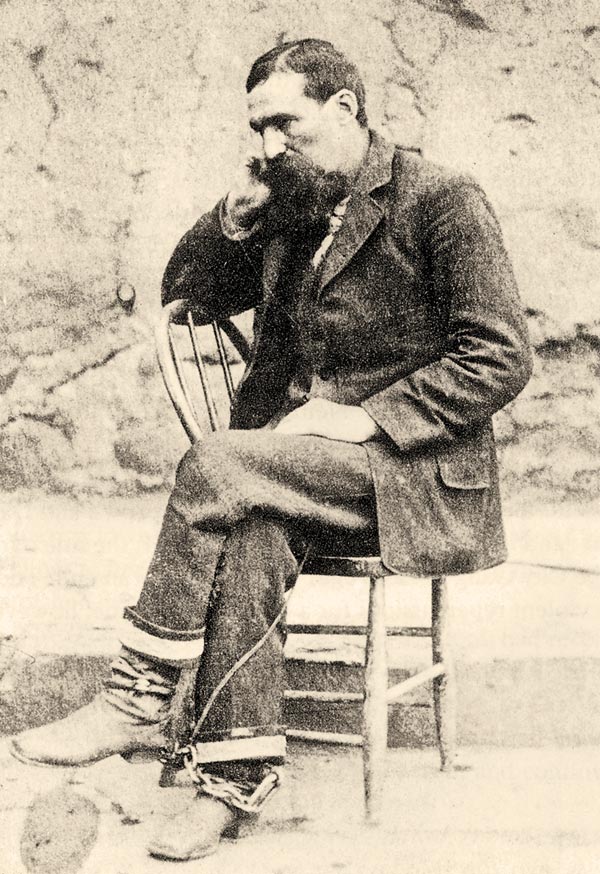
Save Me, Kate
With Bat and his posse taking care of Rudabaugh and his gang after they had doubled back from Texas, Wyatt returned to Dodge City, Kansas, in January 1878. Around this time, his new acquaintance, Doc Holliday, began the flight that would eventually bring him to Dodge City. It was Kate Elder who got him out of a serious jam.
In 1875, Kate was performing in a Dodge City dance hall and was probably a part-time prostitute. Though an attractive woman, her nose was a tad prominent; by 1896, newspapers were calling her Big Nose Kate.
Why she was in Fort Griffin, Texas, in January 1878 is not known. It may have simply been a place to find work at a time of year when saloon jobs were scarce.
She met Doc Holliday there. They had quick tempers, a love for alcohol, independence, restlessness and a low regard for life in common. All that and more would be enough to keep them together despite the knock-down, drag-out fights that would impress those who knew them.
Soon after Wyatt left Fort Griffin to head north, Doc was playing cards with Ed Bailey, a man whose reputation included being a bit of a bully. Doc was the one dealing, and Bailey picked up the discarded cards and looked at them. The former dentist must have been in a mellow mood because he let slide what was a clear violation of Western poker. But when Bailey continued to do it, Doc warned him, and after a couple of unheeded warnings, he simply raked in the pot without revealing to Bailey if his hand was a winner or not.
For Bailey, this was like waving a red flag in front of a bull. Immediately furious, he reached for his gun. Just as it was coming visible above the table, Doc slashed a knife across his stomach. Bailey lurched to his feet, then pitched forward, his blood drooling out across the poker table.
There were witnesses to the incident, so when lawmen arrived, Doc surrendered the knife and cooperated with his arrest. It was clearly a case of self-defense, as the others in the saloon would testify. Because Fort Griffin did not have a jail, Doc was kept in a hotel room until the judge could be found.
But Bailey had friends who didn’t take kindly to him being filleted like a fish. They headed toward the hotel with a long length of rope.
Fortunately for Doc, Kate got wind of what was going on. Thinking fast, she set fire to an old shed filled with hay. The sudden conflagration and the hectic activity involved in trying to douse the fire slowed the lynch mob enough that Kate arrived at the hotel first, a pistol in each hand. This surely intimidated the guard, who ran off. Kate and Doc commandeered a couple of horses and left town while the fire continued to be fought.
Their destination was Dodge City, Kansas. The reason may have been to seek Wyatt’s protection in case some people in Fort Griffin, Texas, went on being agitated about Bailey’s bloody demise. In any event, when the two fugitives arrived, they checked into Deacon Cox’s Boarding House, with Doc signing the register as Dr. and Mrs. J.H. Holliday.
They were so relieved by their escape from the mob that Doc vowed to give up gambling and return to dentistry, and Kate reciprocated by vowing to give up the whoring saloon life. For a time, both were sincere.
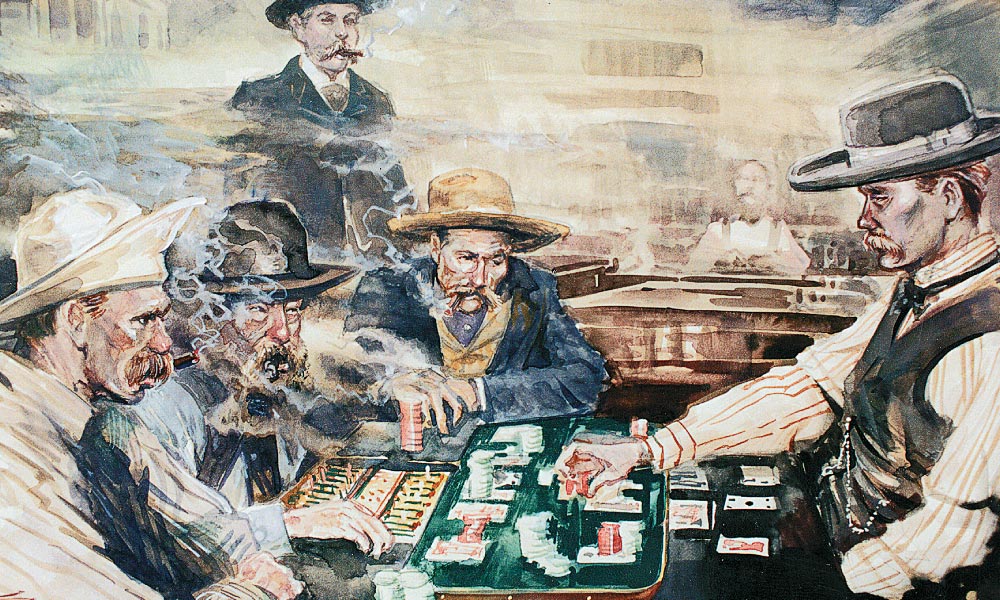
A Puzzling Friendship Begins
The job of taming Dodge City, Kansas, and by extension the American frontier, was incomplete that April. That month saw the first public and certainly the biggest funeral in the brief history of Dodge City. Bat’s brother Ed had been the marshal for six months when drunken cowboy Jack Wagner gunned him down on April 9.
Steady lawmen with experience would be needed like never before in Dodge City in 1878. That year would go down as the one that saw the most cattle arrive from Texas, accompanied by well over 1,000 drovers. That would mean the saloons would operate at full capacity, constantly populated by gamblers and dancing girls and prostitutes and an excess of customers. Drinking and carousing and hurrahing would be a nightly revelry, and not all of it stayed confined to the south side of the Dead Line. How the peace officers handled all this activity would determine whether the city could continue to progress or would descend into chaos.
It was as good a time as any for a confident gambler like Doc Holliday to pull into town. This would be the beginning of people puzzling over Wyatt’s devoted friendship with a man whom others disdained and, with some justification, objected to Doc’s sometimes appalling behavior.
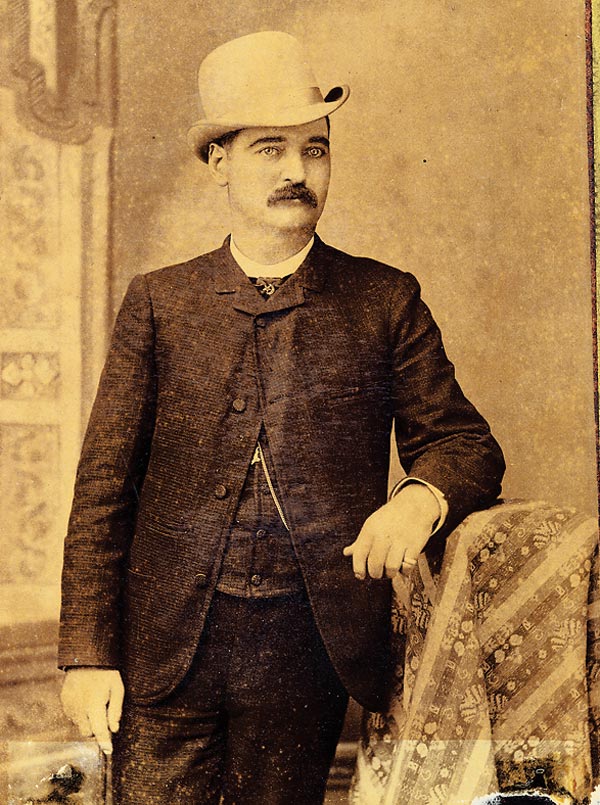
Some years later, reflecting on Doc, whom he described as “long, lean, and ash-blond and the quickest man with a six-shooter I ever knew,” Wyatt recalled that not long after Doc and Big Nose Kate Elder arrived in Dodge City “his quickness saved my life.”
Without identifying who the assailant was, Wyatt told of a man drawing a gun on him while his back was turned. Doc shouted, “Look out, Wyatt!”
Before Wyatt could completely turn around, Doc had jerked his pistol out and shot the man. In his recollection, Wyatt commented, “On such incidents as that are built the friendships of the frontier.”
This incident could have been invented years afterward to justify the odd friendship, but it was not out of character for Doc to have Wyatt’s back, and it would not be the only time.
This is an edited excerpt from Dodge City by Tom Clavin. Copyright ©2017 by the author and reprinted by permission of St. Martin’s Press. A reporter for The New York Times, Clavin has received awards from the Society of Professional Journalists, Marine Corps Heritage Foundation and National Newspaper Association.


